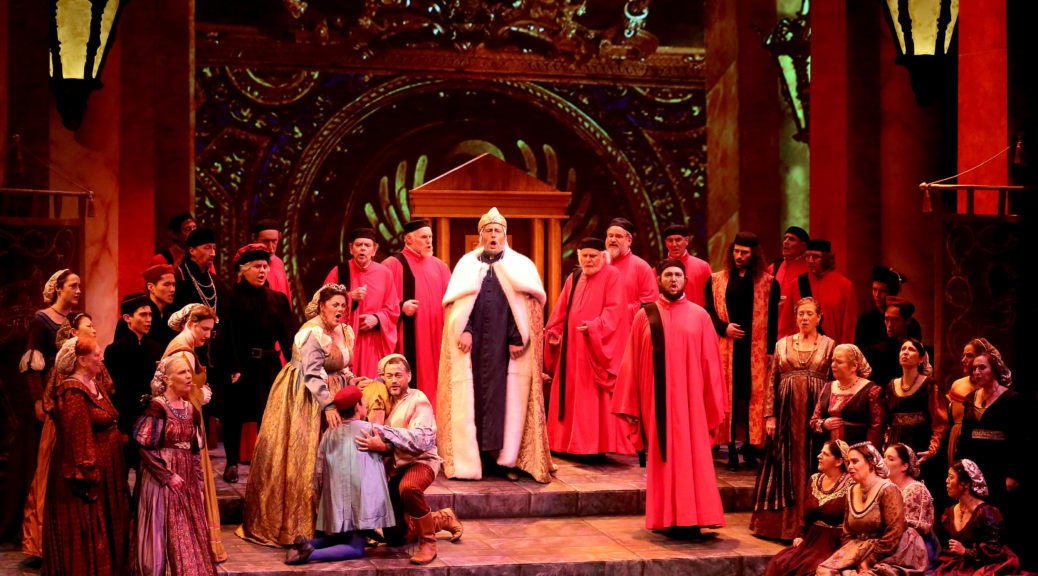
Surprise Verdi, Surprise Troupe
PALO ALTO, CA—The miracle here these days is West Bay Opera producing repertory on a par with professional ones in Italian towns. And only a generation ago WBO was still a sleepy troupe presenting mostly honest amateur productions.
Yet more surprises: In the current Verdi staging, the singer who saved the night wasn’t even in the cast. And the New-World conductor in the pit performing like a true Italian maestro, with poetic baton and a passion for cuing singers, also has a master’s degree in transportation engineering from Berkeley.
It all added up to an unforgettable discovery with the neglected Verdi jewel “I Due Foscari” bringing down the (full) house when heard Feb. 23. And deservedly so.
The figure who saved the night was the arresting stand-in baritone Krassen Karagiozov from Bulgaria in civvies at stage left, singing the key role of the Foscari Doge of Venice in backing up the laryngitis-stricken Jason Duika, who was in full costume mouthing the words.
Most responsible for the WBO ascendancy was the Argentinian-born transportation engineer José Luis Moscovich, the conductor and general director who for a decade or so led, simultaneously, the S.F. County Transportation Authority 40 miles away. Just call him yet another miracle-worker in this bucolic college town of nonstop surprises, home of both Stanford University and notable tech firms.
One of Verdi’s early works, this historical review of the noted father-son Foscari pair “The Two Foscaris” has the elements powering prominent later works: a hero Jacopo who is unjustly framed and incarcerated (like Manrico); a tender dad-daughter scene (like “Rigoletto”); a lovable older solon (sounding like Germont); and a diva who can spout coloratura (like Violetta, though this one is far more Rossinian in its fury).
Admittedly there are similarities to Rossini’s operatic style, especially in the formal cabalettas and strettos of set arias. But Verdi’s expressive power, linked with his plausible scenario, suggest that here we need to rethink what we categorize as good-Verdi or bad-Verdi. Perhaps the abrupt deaths of both Foscaris at the final curtain are a downer for audiences speeding mentally toward a happy ending.
In this site where the pit only has room for about half an orchestra, this small-stage production was handsome and Venetian-lavish, with costumes and projections to match. Once the first-act vocal tautness was past, the singers were effective, though straining a bit at the higher elevations. Tenor Nathan Granner playing the son Jacopo Foscari clearly copied the vocal styling of Luciano Pavarotti, whose recordings had clearly been studied in depth. As his wife Lucrezia, coloratura soprano Christina Major took on the most demanding role with panache. The adversary of the Foscaris, councilman Loredano, brought forth the rich bass-baritone of Benjamin Brady.
Worth noting were both the stage direction of Richard Harrell, and the choreography of Daiane Lopes da Silva, who gave us a rare instance where an (acrobatic) opera ballet made eminent sense, integral rather than interruptive.
MUSIC NOTES—The work, believed to be a Bay Area premiere, had had its debut in 1844, well before Verdi’s early enduring hit “Rigoletto”… The historical incidents of the deposing of the Doge and the calumny leading to Jacopo’s incarceration and exile date back to the 1450s… “Half an orchestra in the pit?” Yes. Brass players are on pedestals out in the wings, while percussion is yet more remote, with closed-circuit coordinating the conductor’s beat with the player… Even then, a reduced orchestration must be used… Now in its 63rd season, the WBO performs in the 420-seat Lucie Stern Theatre. It may well have to look for a roomier space one of these days.
WEST BAY OPERA in Verdi’s “I due Foscari,” in Italian, with supertitles. Two hours and three-quarters. Feb. 23 at the Lucie Stern Theatre, Palo Alto, CA. For info: (650) 424-9999 or go online.